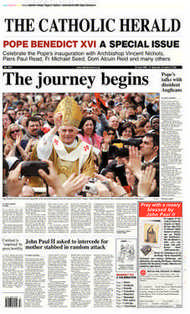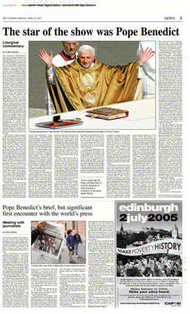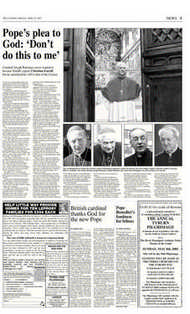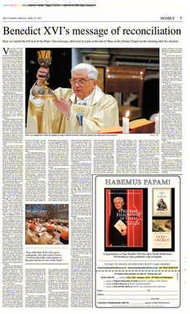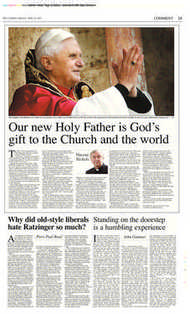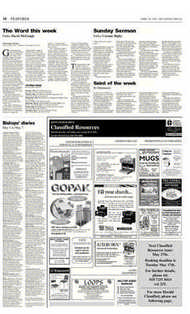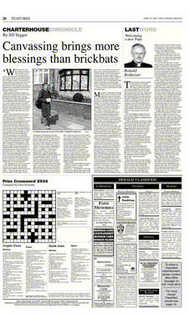Page 6, 29th April 2005
Page 6
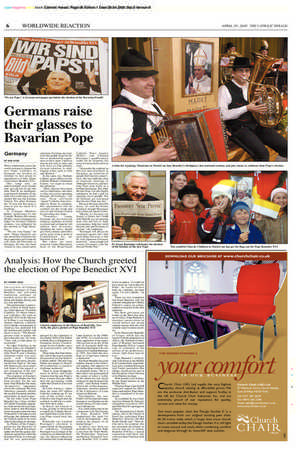
Report an error
Noticed an error on this page?If you've noticed an error in this article please click here to report it.
Tags
Share
Related articles
Save Us From The Clichés About Benedict
We Are Lucky This Pope Is ‘ecclesiastically Incorrect’
Benedict Xvi Brings An Audacious Hope To America
Seeing The Light
Cardinal Claims That Benedict 'rigged' Conclave
Analysis: How the Church greeted the election of Pope Benedict XVI
BY FREDDY GRAY
THE ELECTION of Cardinal Joseph Ratzinger as Pope Benedict has provoked conflicting extremes of emotion across the world: shock and delight, dismay and joy, fear and hope.
This polarisation is particularly evident in North America, where there are 79 million Catholics. To liberal American Catholics, the sight of Benedict XVI on the balcony of St Peter’s was horrifying. Andrew Sullivan, a Britishborn Catholic commentator in America, has predicted that the disillusioned faithful will leave en masse. “The Ratzingerians want to empty the pews and start over,” he wrote. “They will, in that sense, be successful.” Yet other Catholics in the United States are delighted. George Weigel, biographer of John Paul II and a leading American writer, was overjoyed with Cardinal Ratzinger’s elevation, describing the new Pope as “the man best fitted to give an evangelical thrust to this papacy, a new dynamism in the first decade of the 21st century”.
The response of Europe’s 280 million Catholics has also been divided. On the one hand, Pope Benedict has many “progressive” opponents across the continent. His firm orthodoxy naturally offends the secular European mindset, particularly on moral issues.
On the other hand, Pope Benedict has a large number of Catholic European supporters, both on the left and right. Some believe that Ratzinger chose his papal name because St Benedict is the patron saint of Europe, the continent where the Church needs to be most clear in presenting its message.
As Prefect of the Congregation for the Doctrine of Faith, Cardinal Ratzinger spoke out fiercely against antireligious aggression within the European Union. It is thought that he was particularly enraged by the expulsion in November 2004 of the Italian Catholic Rocco Buttiglione as European Justice Commissioner for his Catholic views on homosexuality and the family.
Many hope that Pope Benedict will be the man to combat the perceived secular threat to Catholic beliefs. The left-wing Italian newspaper La Repubblica called him “a warrior to challenge modernity”.
There is some disappointment in Africa and Latin America that the new Pope is from western Europe rather than the developing world where the Church is at its most vibrant.
In Latin America, where there are some 455 million Catholics making up 43 per cent of the world’s total, Catholics had hoped that the cardinals would elect a candidate from their ranks.
In Brazil, the Church is losing ground to Protestant evangelicals. Catholic Brazilians hoped that a Latin American Pope would buck this trend.
Politically, too, Cardinal Ratzinger’s elevation is controversial. As the guardian of orthodoxy, Cardinal Ratzinger was in charge of the crackdown on liberation theology, the Marxist-influenced movement that swept through Latin America in the 1960s and 1970s. As a result he has many opponents in the region who see him as an ally of the rich. Fr Leonardo Boff, the liberation theologian who was silenced by Cardinal Ratzinger in 1985, described the new Pope as “a hard man without compassion.” But Pope Benedict has great support among Latin American prelates who approve of his unflinching conservatism on doctrinal issues. “He is a man with a very good grasp of the reality of today’s world, of the relativism and moral subjectivity that dominate the world,” said Bishop Andres Stanovnik of Reconquista, Argentina, secretary-general of the Conference of Latin American Bishops.
Nevertheless, the new Pontiff will be expected to pay homage to social justice as the central theme of Latin American Catholicism.
It is worth noting that in the conclusion of his first homily as Pope, Benedict XVI emphasised the need for “social development... that respects the dignity of all human beings”.
In Africa, too, there are grumbles that the new Pope is not from the Third World. On Wednesday, Anglican Archbishop Desmond Tutu gave Benedict XVI a rather frosty reception. “I would not have given my vote to the new Pope... he would not have been my candidate...but then again, I’m not Catholic,” he said.
There are also complaints that Pope Benedict will not consider changing the Catholic Church’s stance on contraception in response to the Aids epidemic.
But these grievances are louder in the West than they are in Africa. Pope Benedict’s doctrinal conservatism on sexual matters has strong support among Africans who roundly reject western morality.
In the Democratic Republic of Congo, which has the largest Catholic population in Africa, the National Conference of Bishops welcomed Pope Benedict XVI as “a great sign of continuity in the actions of his predecessor, whose right-hand man he was”.
Pope Benedict’s relationship with Islam in the Middle East is particularly important. Last year, Cardinal Ratzinger told French journalists that Turkey should not be part of the European Union because of its Muslim heritage.
With remarks such as these, he has found enemies in the Middle East.
Whereas Pope John Paul II expressed support for Palestinian nationalism, Pope Benedict is considered to be proIsraeli.
As a cardinal, he was a leading force behind the Vatican’s recognition of Israel in 1993, and John Paul II’s apologies to Judaism.
The international Catholic charity, Aid to the Church in Need has welcomed Pope Benedict. Director Neville Kyrke-Smith said: “Marvellous news. As someone who has preached the Gospel in season and out of season, Benedict XVI has a special connection with those who suffer for their Christian faith today.”
blog comments powered by Disqus


